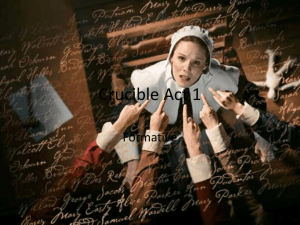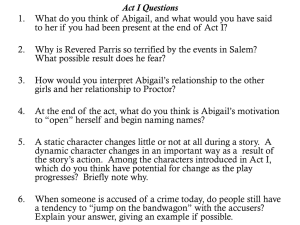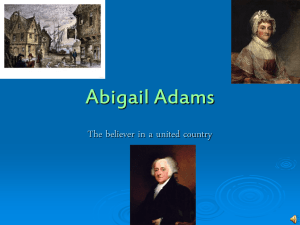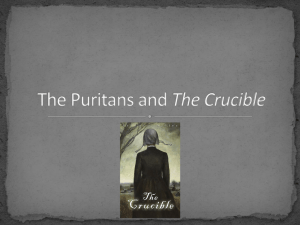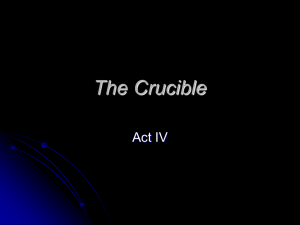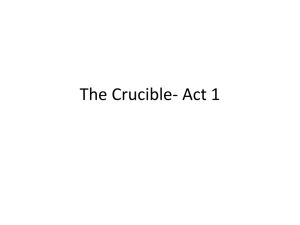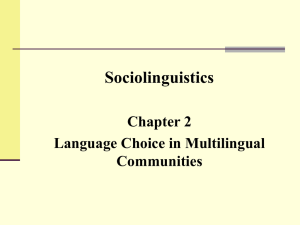The Crucible
advertisement
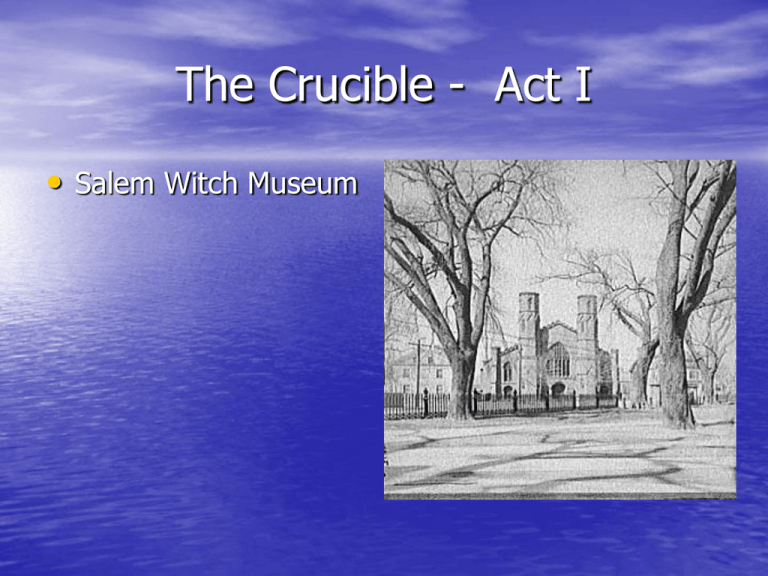
The Crucible - Act I • Salem Witch Museum Background • The word crucible comes from the Latin word for “cross.” • A crucible is any pot made of strong enough material to withstand the heat necessary to melt down metals. • Crucible also means “a severe trial or test.” Opening Commentary • What does the opening paragraph of the commentary tell the reader about Parris? • The commentary prejudices readers against Parris saying that he is a villain. Miller wants readers to know right away that Parris’s motives are base. Tone • What is a time-honored activity among the people at Salem? • Minding one another’s business is the activity. • This reveals the tone, or the attitude of the writer towards the people. The tone is judgmental. Character Motivations • What motives does Miller suggest for the accusations of witchcraft? Note: The penalty for witchcraft was death. – Petty quarrels over property – Other disagreements of long-standing Word Study • Dissembling – disguising one’s real nature or motives • Which character appears at this point to have the capacity for “dissembling”? – Abigail Parris’s Motives • Why is Parris so quick to dismiss the possibility • • • that Betty’s ailment is the result of “unnatural causes”? He knows that if people believe this rumor, he will be in serious trouble. Why is Parris unwilling to tell the congregation that he discovered the girls dancing in the forest? They will blame him for being an irresponsible guardian. Irony • What do his references about his “enemies” reveal about Parris’s personality? • His statements suggest that he is a hostile, and even paranoid, man. • What is ironic about Parris’s personality? • He is a minister, yet he is suspicious, hostile, and cold. Girls’ Motivations • Why did the girls dance naked in the woods when they knew they would be punished if they were caught? • Abigail’s statement, “It were sport,” together with her feigned innocence and her unwillingness to tell the truth suggest that Reverend Parris’s repressive ways prompted the girls to rebel. Putnam’s Motivations • What does Miller tell you about Putnam’s motives? • Putnam resents the fact that his brotherin-law was not accepted as minister of Salem. He avenged himself on the man who got the job by having him jailed. Abigail’s Motivations • Why does Abigail accuse Tituba and Ruth of “conjuring spirits”? • Since Mrs. Putnam has already admitted that she asked Ruth to ask Tituba to communicate with the dead, Abigail makes a safe accusation. She won’t be blamed for the accusation, nor will she be punished for her behavior in the woods. Putnam’s Motivations • What are the Putnams’ motives for blaming Ruth’s illness on witchcraft? • They don’t want to take any blame for having sent Ruth on a dangerous errand or making Ruth participate in the sin of “conjuring up the dead. Therefore, they look for a witch as a scapegoat. Abigail's Motivations • What does the conversation between Abigail and Mercy reveal about the two young women? • They don’t think Ruth and Betty are bewitched. They know they have done something wrong and they may get into trouble. Abigail wants to make sure that they all tell the same story. Characterization • Assess Abigail’s personality. – She is mean to the other girls. – She is a leader who rules the group by inspiring fear. – She hates Goody Proctor. Characterization • Assess John Proctor. – Proctor is a loner. – He relies on his own judgment. – He is not necessarily popular. – He doesn’t like hypocrites. John and Abigail • What does her behavior toward John reveal? • She wants John back in her life. • What does John’s behavior toward Abigail reveal? • He has made up his mind that the affair is over. He does not love her or want her to take his wife’s place. Abigail • Given Abigail’s character, how is she likely to react to John’s reaction? – She may threaten John. – She has already “drunk a charm to kill Goody Proctor”; she may try something like that again. Character Motivation • What was Abigail’s motivation for drinking the • • • blood? She wants to take the place of Goody Proctor. What was John’s motivation for taking Abigail as a lover? He was captivated by her beauty. He could have responded to her feelings for him. He could have allowed lust to get the better of him. Rebecca’s Motivations • What are Rebecca Nurse’s motives for her actions? • Rebecca wants peace in the community. She doesn’t want Hale coming among them because she doesn’t welcome the strife that rumors of witchcraft will cause between neighbors. She is tolerant and calm and tries to make everyone else see reason and get along better. Parris’s Motivations • What was Parris’s motive for calling Hale without consulting the congregation? • He knows he is not popular in the parish. He doesn’t want to call attention to his lack of control over his daughter and niece. Conflict • What is the source of conflict between Proctor • • and Parris? Proctor thinks Parris is unfit to preach; he also thinks Parris is too concerned with the material advantages of being a minister. Parris resents Proctor’s contempt; he believes that the congregation should show their respect for the church by showing respect for his wishes. Characterization • What is Hale’s area of expertise? – He is a learned man and an expert in demonology. – Hale has examines and acquitted one accused witch and her child. – Most of his experience with witchcraft comes from books. Abigail’s Motivations • What does Abigail’s reply to Hale’s questions reveal about her character? • To divert attention from herself, she accuses Tituba. She is willing to sacrifice others to save herself. Abigail’s Motivations • Why does Abigail attack Tituba rather than one of the other girls? • Because Tituba is a slave and from a foreign culture, she is in a weak position. Abigail knows that her word is likely to be taken over Tituba’s. Tituba’s Motivations • Why does Tituba confess to Parris and Hale? • She confesses because the alternative is death. • She is shocked that Abigail would turn on her. She knows no one will believe her against Abigail. She also does not want Abigail hanged. Tituba’s “Confession” • She confesses to witchcraft and to having seen • an unidentified woman with the Devil. The “confession” is entirely the result of suggestions that Hale and Parris make to her. They prompt her, telling her what they want to hear, and she tries to satisfy them without actually accusing any innocent people.

